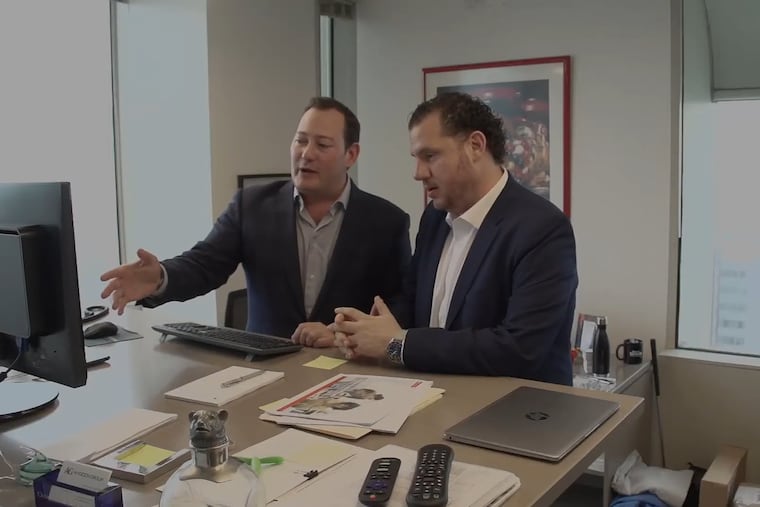This Philly firm weeds ‘real humans’ from ID thieves in class-action suits vs. Apple, Tesla, and more
Angeion, now backed by Renovus, can tell if you’re “a bot, or a click farm, or a real human being”

“Philadelphia invented the class-action lawsuit,” and the work of pioneer litigators like the late Harold Kohn and David Berger has grown into an industry of busy plaintiffs’ law firms, so it’s appropriate that a cottage industry helping administer complaints and settlements targeting big corporations and other institutions has grown up here, says Steve Weisbrot.
The Rutgers Law grad cofounded Angeion Group LLC, a 160-person, Center City-based firm that verifies the identities of consumers, workers, and others who seek to collect cash from class-action settlements. Angeion itself scored a big payday Oct. 8, when it disclosed its first big outside investment from fast-growing, Wayne-based, private-equity investor Renovus Capital Partners. The firm says it typically invests at least $25 million in the companies it targets, but would not comment on the size of its investment in Angeion.
Weisbrot started Angeion in 2013 with the late Christopher Chimicles, son of Philadelphia-based class-action lawyer Nicholas Chimicles. Their firm has investigated and verified clients in class-action complaints against Apple, Facebook, Gopuff, Tesla, the entire group of Ivy League universities, and Volkswagen — more than 2,000 cases in all.
The company uses a growing range of digital sources and software traps “to determine if a [settlement applicant] is a bot, or a click farm, or a real human being,” Weisbrot said in a recent interview.
That means constantly refining tactics to stay ahead of criminals and identity thieves worldwide, who submit phony IDs in hopes of snagging payments they aren’t entitled to. Angeion says it has routed more than $10 billion to bona fide plaintiffs, raking enough in fees to feed the firm’s steady growth.
Angeion “is a market leader in class-action notice and claims administration,” according to Eric Cramer, chairman of Philadelphia class-action plaintiff’s law firm Berger Montague, an Angeion client, in a statement. Cramer called Angeion “one of a handful of companies that has the expertise, bandwidth, and resources to minimize fraud, and maximize payment to class members.”
Weisbrot is “passionate,” and deserves special credit for persevering after Chimicles’ death in 2020 after a short illness, Cramer added.
Weisbrot said Angeion was Chimicles’ idea. As lawyers, “we were friendly competitors.” At a Philadelphia Bar Association event in 2012, Chimicles “asked if I was happy. He pitched me with the idea of starting a claims-administration company. I said we’d have to do it faster, better, smarter,” using digital technologies to sort and move data fast.
The start-up was profitable early, so “we were able to bootstrap” for more than a decade, growing without outside investors, he added. The investment by Renovus, a $2 billion-asset private-equity firm, will accelerate Angeion’s growth, Weisbrot said.
Renovus this year set up its fourth investment fund, raising $875 million from investors, beating its $750 million target. That’s the largest fund Renovus has set up since the firm’s founding in 2010 by partners Atif Gilani, a Penn-trained engineer and Merrill Lynch veteran, and Jesse Serventi and Brad Whitman, who had worked with Gilani at Leeds Equity, investing in private education-related firms.
The firm’s investors include the University of Texas endowment — one of the nation’s largest college investment funds — along with insurers, private-equity funds, and wealthy people.
Gilani says the group sought advice from NewSpring founder Mike DiPiano and other local private-equity pioneers after settling on the Philadelphia area as their base due to an early investor’s interest.
That investor’s pledge fell through, but Gilani and his partners quickly found the region’s mix of potential clients, targets, and staff, and the lower cost of living attractive, and have built their team here. “We were a bunch of New Yorkers doing private equity. We didn’t feel New York was the place for us. We thought this would be a great place to launch our business and raise our families, so we moved here,” added Serventi.
Renovus has invested in more than 100 software, health-care, and professional services companies across the U.S. Local examples include Curtis Learning, a Philadelphia-based scientific-training agency; EMS, an Exton-based medical-simulations provider for medical and nursing schools; SolomonEdwards, a Wayne-based corporate strategy consultant; Thomas J. Paul, a health-care marketing and sales consultant; and Prime Technology Group, a King of Prussia software provider to regulated industries.
The Angeion investment began, Philadelphia-style, with a meeting between Weisbrot and Renovus managing director Lee Minkoff, at Jean-Georges restaurant at the Four Seasons hotel atop the city’s highest building.
Their next meeting, at Capital Grill, included Main Line investment banker Nick Baughan as Angeion’s adviser, Minkoff said. It was a local team: “We were a trifecta of Philadelphia companies,” Weisbrot said.
Renovus “didn’t have the same patina” as some of the big-name Silicon Valley private-equity firms, with their slick approach and laser focus on financial projections. Weisbrot said he liked Minkoff’s broad and relentless interest in Angeion’s business and in Weisbrot’s own career and plans.
“My grandfather told me, ‘Never go into business with anyone you wouldn’t have a beer with,’” Weisbrot said.
He said Angeion will use the money to set up more software teams and develop new applications simultaneously, instead of sequentially. “This money will allow us to percolate ideas faster.”
Correction: This story has been updated to correct Weisbrot’s description of Renovus, and to note that all three Renovus founders previously worked at Leeds Equity.